Intro thread to Iain McGilchrist& #39;s work, based on his mini-book Ways of Attending: How our divided brain constructs the world.
"Attention is not just receptive, but actively creative of the world we inhabit. How we attend makes all the difference to the world we experience."
"Attention is not just receptive, but actively creative of the world we inhabit. How we attend makes all the difference to the world we experience."
Forget everything you thought you knew about the difference between the hemispheres, because it will be largely wrong.
It is not what each hemisphere does — they are both involved in everything — but HOW IT DOES IT that matters.
It is not what each hemisphere does — they are both involved in everything — but HOW IT DOES IT that matters.
The prime difference between the brain hemispheres is how they attend. For reasons of survival we need one hemisphere (left, in humans & many animals) to pay narrow attention to detail, to grab hold of things we need, while the other (right) keeps an eye out for everything else.
> "The result is that one hemisphere is good at utilising the world, the other better at understanding it."
Here& #39;s an image from an RSA animate of a talk McGilchrist gave, illustrating the narrow & broad attention happening simultaneously:
Here& #39;s an image from an RSA animate of a talk McGilchrist gave, illustrating the narrow & broad attention happening simultaneously:
Attention matters.
> "Absent, present, detached, engaged, alienated, empathic, broad or narrow, sustained or piecemeal, attention has the power to alter whatever it meets. The
play of attention can both create and destroy, but it never leaves its object unchanged."
> "Absent, present, detached, engaged, alienated, empathic, broad or narrow, sustained or piecemeal, attention has the power to alter whatever it meets. The
play of attention can both create and destroy, but it never leaves its object unchanged."
The titular fable: the Master and his Emissary
This is one main metaphor McGilchrist uses to point at the different role each hemisphere is best to play, and how that relationship can break down.
This is one main metaphor McGilchrist uses to point at the different role each hemisphere is best to play, and how that relationship can break down.
The next section of Ways of Attending features McGilchrist& #39;s context for being interested in this research, including the Q: "why was it that the things we prized about the work of a great poet, turned to a handful of dust when one tried to inspect them more closely?"
IM is well-aware the topic is passé:
> "Some of you may already be thinking: not the old chestnut about the hemispheres again, surely?
> Despite frequent acknowledgment by many leading neuroscientists that there do seem to be fundamental differences between the hemispheres...
> "Some of you may already be thinking: not the old chestnut about the hemispheres again, surely?
> Despite frequent acknowledgment by many leading neuroscientists that there do seem to be fundamental differences between the hemispheres...
> scientists have largely given up trying to put their finger on what these might be, piece after piece of information showing that every conceivable activity – language, visual imagery, and all the things we thought in the past distinguished them—is served by both hemispheres."
> The problem is that we generally look at the brain as having “functions”, and if you do that, sure enough, those functions are shared by both hemispheres.
> But if you look, not at what the brain does as if it were just a machine, but at how – in the sense of “in what manner” – it does it, as if it were part of a living person, some very important differences start to emerge. https://twitter.com/callumflack/status/1234818118335074304">https://twitter.com/callumfla...
> My view: the relationship between the hemispheres, like that of the master & his emissary... is not symmetrical.
> Each needs the other; each has an important role to play. But those roles are not equal—one depends more on the other and needs to be aware of that fact.
> Each needs the other; each has an important role to play. But those roles are not equal—one depends more on the other and needs to be aware of that fact.
> So I am not going to argue anything as facile as that the left hemisphere is “mistaken” in what it sees or what it values.
> It is not: but its vision is necessarily limited.
> The problem comes with its unawareness of that fact.
> It is not: but its vision is necessarily limited.
> The problem comes with its unawareness of that fact.
1st Q: why is the brain divided at all?
> If the whole purpose of the brain is to make connections, and if, as many believe, consciousness arises, in some yet to be specified manner, from the sheer interconnectedness of such a vast array of neurons, why chop it down the middle?
> If the whole purpose of the brain is to make connections, and if, as many believe, consciousness arises, in some yet to be specified manner, from the sheer interconnectedness of such a vast array of neurons, why chop it down the middle?
> It could have evolved as a single mass. But, in fact, hemisphere divisions go right down the phylogenetic tree. So whatever it is for, it must operate, not just for man, but also for animals and birds. What is that?"
< he notes it& #39;s not from language or righthandedness >
< he notes it& #39;s not from language or righthandedness >
> If we come to look at the evolution of language, we find further puzzles. Why do we have language at all? Surely, in order to communicate. And if not that, then at least to think. But neither of these propositions is true.
Music came first. https://twitter.com/Malcolm_Ocean/status/1157521098654781440">https://twitter.com/Malcolm_O...
Music came first. https://twitter.com/Malcolm_Ocean/status/1157521098654781440">https://twitter.com/Malcolm_O...
Moreover, IM notes, while vocab is based in the left hemisphere, most of the rest of communication is more based in the right—the "music of speech":
- intonation
- irony
- metaphor
- context
> Language is not necessary for thinking/communicating, just for certain kinds of [such]
- intonation
- irony
- metaphor
- context
> Language is not necessary for thinking/communicating, just for certain kinds of [such]
> My view is that language and the hand have a certain common agenda – that is, they enable us to grasp things: to pin them down and make them useful. And we cannot deny that they have done that in spades. https://twitter.com/Malcolm_Ocean/status/1257776277475508229">https://twitter.com/Malcolm_O...
> They have helped us to use the world and, by doing so, to develop many of the things of which we are most justly proud, the fruits of civilisation. But there is a price for this kind of approach to the world. https://twitter.com/Malcolm_Ocean/status/1188192465771208704">https://twitter.com/Malcolm_O...
~> Attention may sound a bit boring... just another “cognitive function” – but it& #39;s actually the way in which we relate to the world.
> It doesn’t just dictate the kind of relationship we have with whatever it is: it dictates what it is that we come to have a relationship with.
> It doesn’t just dictate the kind of relationship we have with whatever it is: it dictates what it is that we come to have a relationship with.
IM takes a case study of an animal simultaneously:
 https://abs.twimg.com/emoji/v2/... draggable="false" alt="👀" title="Augen" aria-label="Emoji: Augen"> focusing narrowly with its left hemisphere on discerning food from not-food
https://abs.twimg.com/emoji/v2/... draggable="false" alt="👀" title="Augen" aria-label="Emoji: Augen"> focusing narrowly with its left hemisphere on discerning food from not-food
 https://abs.twimg.com/emoji/v2/... draggable="false" alt="👁️" title="Auge" aria-label="Emoji: Auge"> attending broadly with its right hemisphere to unknowns in the environment (friend or foe)
https://abs.twimg.com/emoji/v2/... draggable="false" alt="👁️" title="Auge" aria-label="Emoji: Auge"> attending broadly with its right hemisphere to unknowns in the environment (friend or foe)
These 2 modes are incompatible; hence need for split https://abs.twimg.com/emoji/v2/... draggable="false" alt="🧠" title="Gehirn" aria-label="Emoji: Gehirn">
https://abs.twimg.com/emoji/v2/... draggable="false" alt="🧠" title="Gehirn" aria-label="Emoji: Gehirn">
These 2 modes are incompatible; hence need for split
> In humans, because of the development of the frontal lobes, which enable us to stand back from the world, the need for specialisation becomes greater.
> As we stand back, we can see the world either as separate from ourselves, as something we can use, or as quite the opposite – as connected to ourselves more deeply: we can see others, for the first time, as beings like ourselves, the ground of empathy.
> Being able to represent the world artificially – to map it conceptually, substituting tokens for things, like the general’s map at army HQ – enables us to have an overall strategy; this is what language achieves. But it inhibits us from being there, in the experiential world.
> So for humans the need to have both ways of understanding the world, and yet keeping them apart, is paramount. https://twitter.com/Malcolm_Ocean/status/1101313541640982528">https://twitter.com/Malcolm_O...
> "Unfortunately, though the hemispheres need to cooperate, they find themselves in competition, simply because the left hemisphere’s take on things is such that it thinks it knows it all, while it *cannot* be aware of what the right hemisphere knows.
> Each needs the other, but the left hemisphere is more dependent on the right than the right is on the left.
> Yet it thinks exactly the opposite and believes that it can “go it alone”.
> Yet it thinks exactly the opposite and believes that it can “go it alone”.
> I believe the battle between the hemispheres (which is only a battle from the left hemisphere’s point of view) explains the shape of the history of ideas in the West and explains the predicament we find ourselves in today."
How our divided brain constructs the world: what does brain research reveal about the different kinds of world each hemisphere creates?
In Ways of Attending, McGilchrist notes that he& #39;s compressing things immensely—I& #39;m of course going a whole step further with this tweetstorm https://abs.twimg.com/emoji/v2/... draggable="false" alt="😂" title="Gesicht mit Freudentränen" aria-label="Emoji: Gesicht mit Freudentränen">
https://abs.twimg.com/emoji/v2/... draggable="false" alt="😂" title="Gesicht mit Freudentränen" aria-label="Emoji: Gesicht mit Freudentränen">
In Ways of Attending, McGilchrist notes that he& #39;s compressing things immensely—I& #39;m of course going a whole step further with this tweetstorm
The hemispheres have distinct architecture, the right being more nonlocally connected /parallelized
Right also uses more norepinephrine whereas the left uses more dopamine, which makes sense to me in relation to the classic phenomenon of "stimulant narrows focus of attention"
Right also uses more norepinephrine whereas the left uses more dopamine, which makes sense to me in relation to the classic phenomenon of "stimulant narrows focus of attention"
~> whatever we experience comes to us first – it “presences” to us in unpreconceived freshness – in the RHem.
~> New exp of all kinds – whether music, words, imaginary constructs, objects... even skills... is dealt with by the left hemisphere only later, once it becomes familiar
~> New exp of all kinds – whether music, words, imaginary constructs, objects... even skills... is dealt with by the left hemisphere only later, once it becomes familiar
> The right hemisphere is better at making connections between things: it tends to see things whole, whereas the left hemisphere sees the parts.
> The LH tends to see things more in the abstract, the RH sees them more embedded in the real-world context in which they occur.
> The LH tends to see things more in the abstract, the RH sees them more embedded in the real-world context in which they occur.
> As a corollary, the right hemisphere seems better able to appreciate actually existing things in all their uniqueness, while the left hemisphere schematises and generalises things into categories.
~> the LH is better attuned to tools & to whatever is inanimate, mechanical, machine-like, & which it itself has made: such things are understandable in their own terms, because they were put together by it, piece by piece, & they are ideally suited to this kind of understanding
> In contrast, the right hemisphere is adapted to dealing with living things, which are flexible, organic, constantly changing, and which it has not made.
Further on music & art, and the extent to which both of them rely on the betweenness & relationality that characterizes the right hemisphere& #39;s perspective.
On emotion—anger is lateralized to the left, but everything else to the right, including empathy.
https://twitter.com/Malcolm_Ocean/status/1113149277566570502">https://twitter.com/Malcolm_O...
https://twitter.com/Malcolm_Ocean/status/1113149277566570502">https://twitter.com/Malcolm_O...
> Only the right hemisphere has a whole-body image; the LH sees the body as an assemblage of parts and as if it were an object in space alongside other objects, rather than a mode of existence. For the RH, we live the body; for the LH, we live in it, rather as we drive a car.
> Reasoning is by no means confined to the LH, though sequential analysis largely is. Deductive reasoning, many kinds of mathematical procedures and problem-solving, and the phenomenon of sudden insight into the nature of a complex construct seem to be underwritten by the RH
Overall
~> Experience is forever in motion, ramifying and unpredictable. In order for us to know anything at all, that thing must have enduring properties. If all things flow... one will always be taken unawares by experience: since nothing is repeated, nothing can ever be known
~> Experience is forever in motion, ramifying and unpredictable. In order for us to know anything at all, that thing must have enduring properties. If all things flow... one will always be taken unawares by experience: since nothing is repeated, nothing can ever be known
> We have to find a way of fixing it as it flies, stepping back from the immediacy of experience, stepping outside the flow. Hence the brain has to attend to the world in two completely different ways, and in so doing to bring two different worlds into being.
> In the one, that of the RH, we experience the live, complex, embodied world of individual, always unique, beings, forever in flux, a net of interdependencies, forming and reforming wholes, a world with which we are deeply connected.
> In the other, that of the LH, we “experience” our experience in a special way: a “re- presented” version of it, containing now static, separable, bounded, but essentially fragmented entities, grouped into classes on which predictions can be based.
> LH attention isolates, fixes & makes each thing explicit by bringing it under the spotlight of attention. In doing so it renders things inert, mechanical, lifeless.
~> ...also enables us for the first time to know, & consequently to learn & to make things. This gives us power.
~> ...also enables us for the first time to know, & consequently to learn & to make things. This gives us power.
> These two aspects of the world are not symmetrically opposed. They are not equivalent, for example, to the “subjective” & “objective” points of view, concepts that are themselves a product of, & reflect, one particular way
of being in the world—[the LH& #39;s way]"
of being in the world—[the LH& #39;s way]"
With the RH,
~> we experience the world pre-reflectively, before we have had a chance to “view” it at all or to divide it up
into bits – a world in which what may *LATER* come to be thought of as subjective/objective are held in a suspension that embraces each potential “pole”
~> we experience the world pre-reflectively, before we have had a chance to “view” it at all or to divide it up
into bits – a world in which what may *LATER* come to be thought of as subjective/objective are held in a suspension that embraces each potential “pole”
> These are not different ways of THINKING ABOUT the world: they are different ways of BEING IN the world. And their difference is not symmetrical, but fundamentally asymmetrical. https://twitter.com/Malcolm_Ocean/status/1134976325029113856">https://twitter.com/Malcolm_O...
The right hemisphere& #39;s attention is outward, to the Other; the left hemisphere& #39;s is inward, on its virtual world.
https://twitter.com/Malcolm_Ocean/status/1214444739531100160">https://twitter.com/Malcolm_O...
https://twitter.com/Malcolm_Ocean/status/1214444739531100160">https://twitter.com/Malcolm_O...
> You might say: ok, here are two different ways of conceiving the world: but how do you know that they are not equally valid? I say that they are both very important—both, in fact, essential for our ability to lead civilised lives—but not equally valid. https://twitter.com/Malcolm_Ocean/status/1222017434313461760">https://twitter.com/Malcolm_O...
IM references the foundational crisis of mathematics, where people setting out to create the perfect internally-valid trustable system (the LH& #39;s dream) ended up instead proving the impossibility of creating such a system.
Also:
- broad attention must come before we choose what to focus on
- there is a whole everything to behold before it can be broken into parts
- analysis of speech & gesture shows thought often precedes verbal articulation
- representation first requires it to be present
- broad attention must come before we choose what to focus on
- there is a whole everything to behold before it can be broken into parts
- analysis of speech & gesture shows thought often precedes verbal articulation
- representation first requires it to be present
> What the left hemisphere offers is, then, a valuable but intermediate process, one of “unpacking” what is there & handing it back to the right hemisphere, where it can once again be integrated into the experiential whole
(as w/ practicing a song—fragmenting then reintegrating)
(as w/ practicing a song—fragmenting then reintegrating)
(A brief aside: the buddhist perspective holds there as being a sixth sense organ, the mind. This seems to me very consonant with the view McGilchrist presents, with the left hemisphere essentially playing this role: an internal logic machine & simulator, for use by the RHem)
However, McGilchrist notes, there& #39;s a tendency for the LH to try to take over, because from within its oversimplified virtual world, that world appears complete.
And thanks to role in language, it has control of the media & can propagandize and delegitimize the RH& #39;s perspective.
And thanks to role in language, it has control of the media & can propagandize and delegitimize the RH& #39;s perspective.
McGilchrist makes a pretty serious case for "LH has taken over" as a diagnosis about our present situation, culturally.
Reading TMahE was 1st time I distinguished the Renaissance, Reformation, Enlightenment.
See also "[what scientists do] is not scientific method as conceived"
Reading TMahE was 1st time I distinguished the Renaissance, Reformation, Enlightenment.
See also "[what scientists do] is not scientific method as conceived"
> Let’s do a thought experiment. What would it look like if the left hemisphere came to be the sole purveyor of our reality?
 https://abs.twimg.com/emoji/v2/... draggable="false" alt="🔢" title="Eingabesymbol für Ziffern" aria-label="Emoji: Eingabesymbol für Ziffern"> big picture reduced to meaningless bits
https://abs.twimg.com/emoji/v2/... draggable="false" alt="🔢" title="Eingabesymbol für Ziffern" aria-label="Emoji: Eingabesymbol für Ziffern"> big picture reduced to meaningless bits
 https://abs.twimg.com/emoji/v2/... draggable="false" alt="🧑🏭" title="Factory worker" aria-label="Emoji: Factory worker"> increased specialization & siloing
https://abs.twimg.com/emoji/v2/... draggable="false" alt="🧑🏭" title="Factory worker" aria-label="Emoji: Factory worker"> increased specialization & siloing
 https://abs.twimg.com/emoji/v2/... draggable="false" alt="ℹ️" title="Informationsquelle" aria-label="Emoji: Informationsquelle"> information valued over wisdom
https://abs.twimg.com/emoji/v2/... draggable="false" alt="ℹ️" title="Informationsquelle" aria-label="Emoji: Informationsquelle"> information valued over wisdom
 https://abs.twimg.com/emoji/v2/... draggable="false" alt="🎓" title="Doktorhut" aria-label="Emoji: Doktorhut"> paper qualifications over experience
https://abs.twimg.com/emoji/v2/... draggable="false" alt="🎓" title="Doktorhut" aria-label="Emoji: Doktorhut"> paper qualifications over experience
What else if LH runs the show?
 https://abs.twimg.com/emoji/v2/... draggable="false" alt="👃" title="Nase" aria-label="Emoji: Nase"> abstraction & thingification of human body, world, art, etc
https://abs.twimg.com/emoji/v2/... draggable="false" alt="👃" title="Nase" aria-label="Emoji: Nase"> abstraction & thingification of human body, world, art, etc
 https://abs.twimg.com/emoji/v2/... draggable="false" alt="🧑💼" title="Office worker" aria-label="Emoji: Office worker"> fewer people doing work involving lived world, more manipulating numbers & plans & procedures
https://abs.twimg.com/emoji/v2/... draggable="false" alt="🧑💼" title="Office worker" aria-label="Emoji: Office worker"> fewer people doing work involving lived world, more manipulating numbers & plans & procedures
 https://abs.twimg.com/emoji/v2/... draggable="false" alt="💵" title="Banknote mit Dollar-Zeichen" aria-label="Emoji: Banknote mit Dollar-Zeichen"> fungibility - loss of sense of uniqueness
https://abs.twimg.com/emoji/v2/... draggable="false" alt="💵" title="Banknote mit Dollar-Zeichen" aria-label="Emoji: Banknote mit Dollar-Zeichen"> fungibility - loss of sense of uniqueness
 https://abs.twimg.com/emoji/v2/... draggable="false" alt="🤖" title="Robotergesicht" aria-label="Emoji: Robotergesicht"> machine metaphors
https://abs.twimg.com/emoji/v2/... draggable="false" alt="🤖" title="Robotergesicht" aria-label="Emoji: Robotergesicht"> machine metaphors
 https://abs.twimg.com/emoji/v2/... draggable="false" alt="🔲" title="Schwarzes Quadrat" aria-label="Emoji: Schwarzes Quadrat"> either/or
https://abs.twimg.com/emoji/v2/... draggable="false" alt="🔲" title="Schwarzes Quadrat" aria-label="Emoji: Schwarzes Quadrat"> either/or
Yet more, if LH in charge?
 https://abs.twimg.com/emoji/v2/... draggable="false" alt="🙄" title="Gesicht mit rollenden Augen" aria-label="Emoji: Gesicht mit rollenden Augen"> derogation of higher values, cynicism
https://abs.twimg.com/emoji/v2/... draggable="false" alt="🙄" title="Gesicht mit rollenden Augen" aria-label="Emoji: Gesicht mit rollenden Augen"> derogation of higher values, cynicism
 https://abs.twimg.com/emoji/v2/... draggable="false" alt="👤" title="Silhouette einer Büste" aria-label="Emoji: Silhouette einer Büste"> impersonal replacing personal
https://abs.twimg.com/emoji/v2/... draggable="false" alt="👤" title="Silhouette einer Büste" aria-label="Emoji: Silhouette einer Büste"> impersonal replacing personal
 https://abs.twimg.com/emoji/v2/... draggable="false" alt="💔" title="Gebrochenes Herz" aria-label="Emoji: Gebrochenes Herz"> social cohesion disrupted
https://abs.twimg.com/emoji/v2/... draggable="false" alt="💔" title="Gebrochenes Herz" aria-label="Emoji: Gebrochenes Herz"> social cohesion disrupted
 https://abs.twimg.com/emoji/v2/... draggable="false" alt="🕸️" title="Spinnennetz" aria-label="Emoji: Spinnennetz"> context devalued
https://abs.twimg.com/emoji/v2/... draggable="false" alt="🕸️" title="Spinnennetz" aria-label="Emoji: Spinnennetz"> context devalued
 https://abs.twimg.com/emoji/v2/... draggable="false" alt="⛏️" title="Spitzhacke" aria-label="Emoji: Spitzhacke"> exploitation, not cooperation, as default interaction
https://abs.twimg.com/emoji/v2/... draggable="false" alt="⛏️" title="Spitzhacke" aria-label="Emoji: Spitzhacke"> exploitation, not cooperation, as default interaction
 https://abs.twimg.com/emoji/v2/... draggable="false" alt="😡" title="Schmollendes Gesicht" aria-label="Emoji: Schmollendes Gesicht"> resentment leading to overemphasis on uniformity/equality
https://abs.twimg.com/emoji/v2/... draggable="false" alt="😡" title="Schmollendes Gesicht" aria-label="Emoji: Schmollendes Gesicht"> resentment leading to overemphasis on uniformity/equality
What else?
 https://abs.twimg.com/emoji/v2/... draggable="false" alt="👀" title="Augen" aria-label="Emoji: Augen"> govt paranoia & obsession w control
https://abs.twimg.com/emoji/v2/... draggable="false" alt="👀" title="Augen" aria-label="Emoji: Augen"> govt paranoia & obsession w control
 https://abs.twimg.com/emoji/v2/... draggable="false" alt="🤔" title="Denkendes Gesicht" aria-label="Emoji: Denkendes Gesicht"> reasonableness replaced by rationality
https://abs.twimg.com/emoji/v2/... draggable="false" alt="🤔" title="Denkendes Gesicht" aria-label="Emoji: Denkendes Gesicht"> reasonableness replaced by rationality
 https://abs.twimg.com/emoji/v2/... draggable="false" alt="🤦♀️" title="Frau schlägt sich die Hand vors Gesicht" aria-label="Emoji: Frau schlägt sich die Hand vors Gesicht"> failure of common sense (relies on hemisphere cooperation)
https://abs.twimg.com/emoji/v2/... draggable="false" alt="🤦♀️" title="Frau schlägt sich die Hand vors Gesicht" aria-label="Emoji: Frau schlägt sich die Hand vors Gesicht"> failure of common sense (relies on hemisphere cooperation)
 https://abs.twimg.com/emoji/v2/... draggable="false" alt="❓" title="Rotes Fragezeichen-Symbol" aria-label="Emoji: Rotes Fragezeichen-Symbol">loss of insight
https://abs.twimg.com/emoji/v2/... draggable="false" alt="❓" title="Rotes Fragezeichen-Symbol" aria-label="Emoji: Rotes Fragezeichen-Symbol">loss of insight
 https://abs.twimg.com/emoji/v2/... draggable="false" alt="🤷♂️" title="Achselzuckender Mann" aria-label="Emoji: Achselzuckender Mann">unwillingness to take responsibility
https://abs.twimg.com/emoji/v2/... draggable="false" alt="🤷♂️" title="Achselzuckender Mann" aria-label="Emoji: Achselzuckender Mann">unwillingness to take responsibility
 https://abs.twimg.com/emoji/v2/... draggable="false" alt="🤨" title="Gesicht mit hochgezogener Augenbraue" aria-label="Emoji: Gesicht mit hochgezogener Augenbraue"> intolerance & inflexibility
https://abs.twimg.com/emoji/v2/... draggable="false" alt="🤨" title="Gesicht mit hochgezogener Augenbraue" aria-label="Emoji: Gesicht mit hochgezogener Augenbraue"> intolerance & inflexibility
 https://abs.twimg.com/emoji/v2/... draggable="false" alt="🙉" title="Nichts hören-Affe" aria-label="Emoji: Nichts hören-Affe"> unwillingness to change one& #39;s mind
https://abs.twimg.com/emoji/v2/... draggable="false" alt="🙉" title="Nichts hören-Affe" aria-label="Emoji: Nichts hören-Affe"> unwillingness to change one& #39;s mind
But wait—there& #39;s more!
 https://abs.twimg.com/emoji/v2/... draggable="false" alt="🤩" title="Vom Star geblendet" aria-label="Emoji: Vom Star geblendet"> resentment & undercutting of awe/wonder
https://abs.twimg.com/emoji/v2/... draggable="false" alt="🤩" title="Vom Star geblendet" aria-label="Emoji: Vom Star geblendet"> resentment & undercutting of awe/wonder
 https://abs.twimg.com/emoji/v2/... draggable="false" alt="👻" title="Geist" aria-label="Emoji: Geist"> religion seen as mere fantasy
https://abs.twimg.com/emoji/v2/... draggable="false" alt="👻" title="Geist" aria-label="Emoji: Geist"> religion seen as mere fantasy
 https://abs.twimg.com/emoji/v2/... draggable="false" alt="🤝" title="Handschlag" aria-label="Emoji: Handschlag"> tacit knowing, non-verbal communication, & implicit contracts downgraded
https://abs.twimg.com/emoji/v2/... draggable="false" alt="🤝" title="Handschlag" aria-label="Emoji: Handschlag"> tacit knowing, non-verbal communication, & implicit contracts downgraded
 https://abs.twimg.com/emoji/v2/... draggable="false" alt="🗳️" title="Wahlurne mit Stimmzettel" aria-label="Emoji: Wahlurne mit Stimmzettel"> democracy strangled by ever-complicating rules
https://abs.twimg.com/emoji/v2/... draggable="false" alt="🗳️" title="Wahlurne mit Stimmzettel" aria-label="Emoji: Wahlurne mit Stimmzettel"> democracy strangled by ever-complicating rules
 https://abs.twimg.com/emoji/v2/... draggable="false" alt="🐾" title="Pfotenabdrücke" aria-label="Emoji: Pfotenabdrücke"> intolerance for ambiguity, rather than appreciation
https://abs.twimg.com/emoji/v2/... draggable="false" alt="🐾" title="Pfotenabdrücke" aria-label="Emoji: Pfotenabdrücke"> intolerance for ambiguity, rather than appreciation
> Does that ring any bells? In terms of the fable with which I began, the emissary, insightless as ever, appears to believe it can see everything, do everything, alone. But it cannot: on its own it is like a zombie, a sleepwalker
ambling towards the abyss, whistling a happy tune.
ambling towards the abyss, whistling a happy tune.
Thus concludes my summary of Iain McGilchrist& #39;s book Ways of Attending!
If you& #39;ve read this, you& #39;re now very well-equipped to dive into my explorations https://abs.twimg.com/emoji/v2/... draggable="false" alt="👇" title="Rückhand Zeigefinger nach unten" aria-label="Emoji: Rückhand Zeigefinger nach unten"> of how the model relates to to many other topics:
https://abs.twimg.com/emoji/v2/... draggable="false" alt="👇" title="Rückhand Zeigefinger nach unten" aria-label="Emoji: Rückhand Zeigefinger nach unten"> of how the model relates to to many other topics:
- buddhism
- grieving
- AI
- systems thinking
- &+ https://twitter.com/Malcolm_Ocean/status/1128389775134687234">https://twitter.com/Malcolm_O...
If you& #39;ve read this, you& #39;re now very well-equipped to dive into my explorations
- buddhism
- grieving
- AI
- systems thinking
- &+ https://twitter.com/Malcolm_Ocean/status/1128389775134687234">https://twitter.com/Malcolm_O...
Or maybe you want to go straight to the source!
The Master and his Emissary is one of my all-time favorite books and it has profoundly affected my relationship with myself and my relationships with other people.
Get a copy here: https://amzn.to/2LgKkX8 ">https://amzn.to/2LgKkX8&q...
The Master and his Emissary is one of my all-time favorite books and it has profoundly affected my relationship with myself and my relationships with other people.
Get a copy here: https://amzn.to/2LgKkX8 ">https://amzn.to/2LgKkX8&q...

 Read on Twitter
Read on Twitter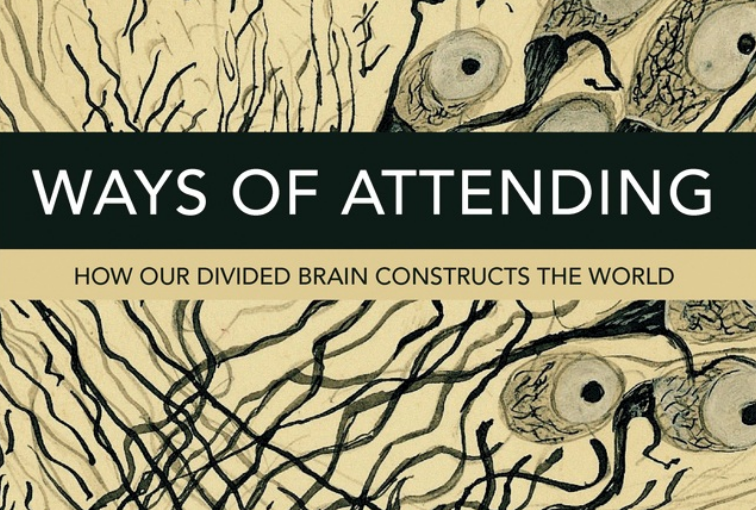
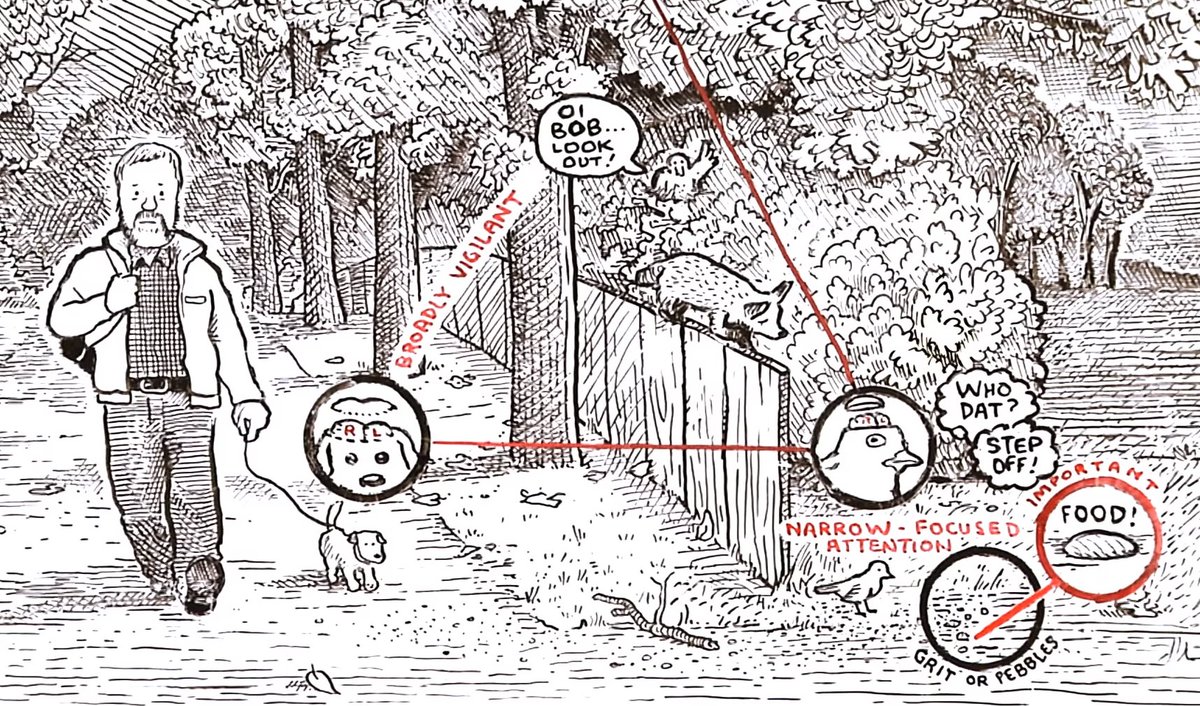
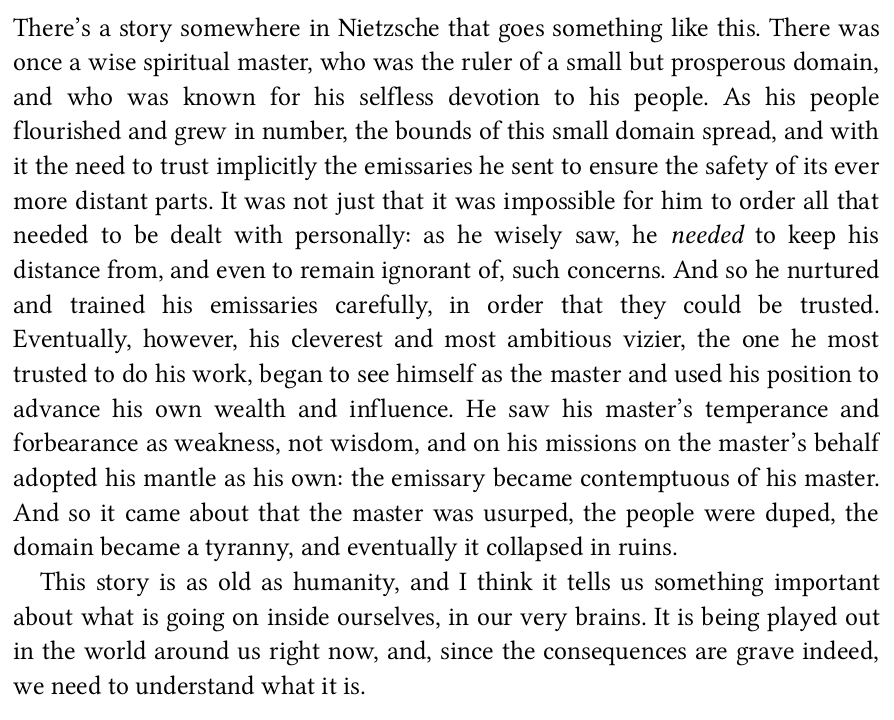
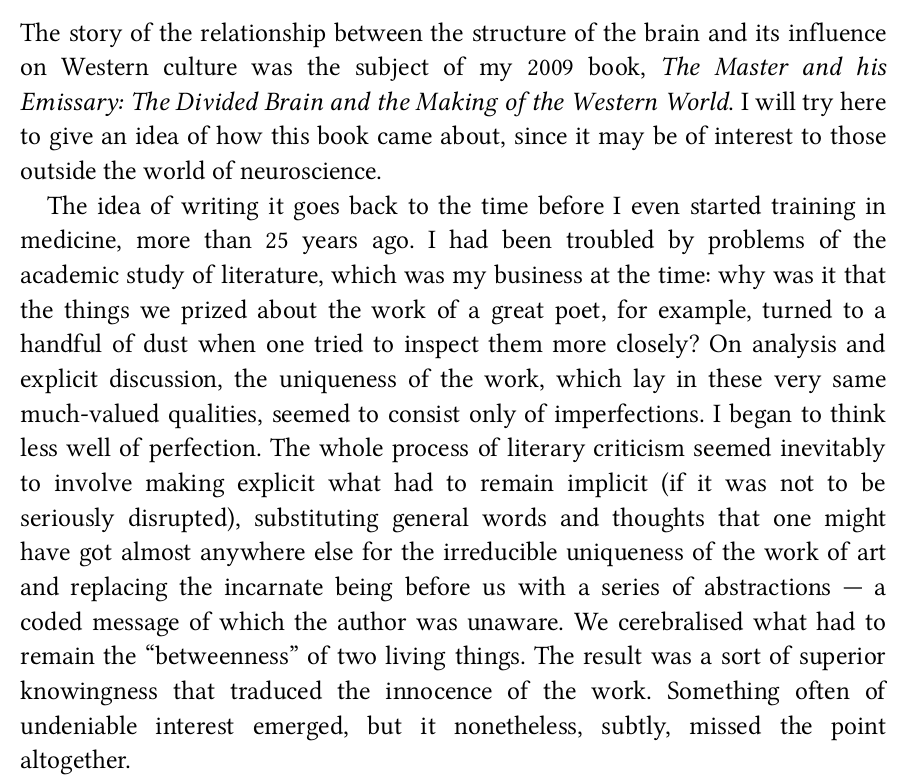

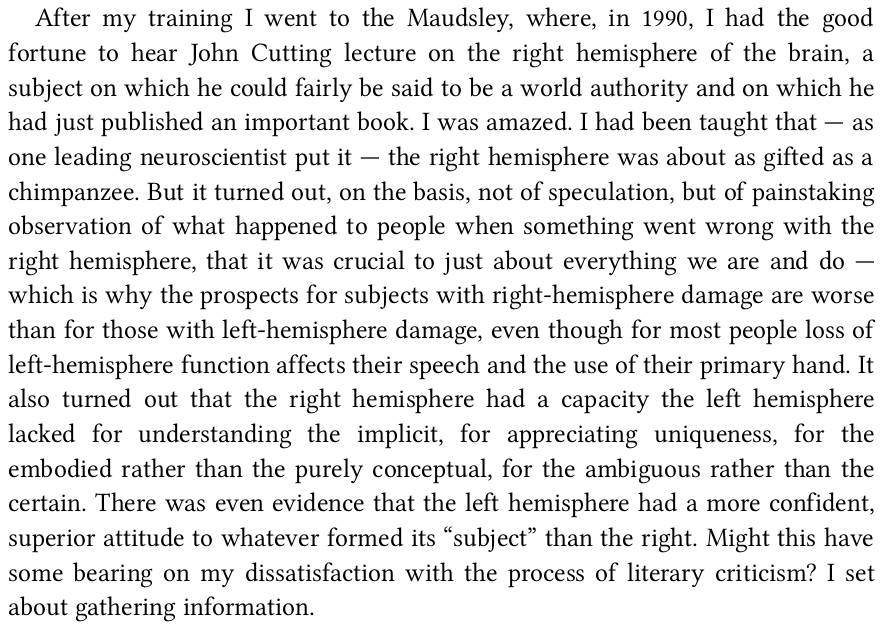
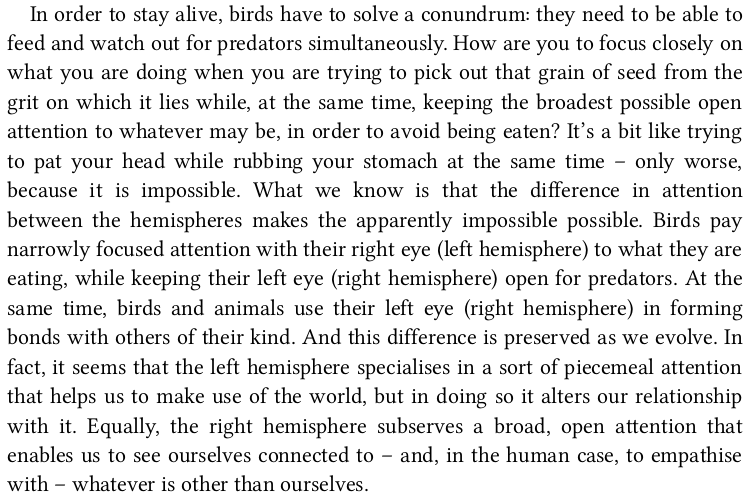 focusing narrowly with its left hemisphere on discerning food from not-foodhttps://abs.twimg.com/emoji/v2/... draggable="false" alt="👁️" title="Auge" aria-label="Emoji: Auge"> attending broadly with its right hemisphere to unknowns in the environment (friend or foe)These 2 modes are incompatible; hence need for split https://abs.twimg.com/emoji/v2/... draggable="false" alt="🧠" title="Gehirn" aria-label="Emoji: Gehirn">" title="IM takes a case study of an animal simultaneously:https://abs.twimg.com/emoji/v2/... draggable="false" alt="👀" title="Augen" aria-label="Emoji: Augen"> focusing narrowly with its left hemisphere on discerning food from not-foodhttps://abs.twimg.com/emoji/v2/... draggable="false" alt="👁️" title="Auge" aria-label="Emoji: Auge"> attending broadly with its right hemisphere to unknowns in the environment (friend or foe)These 2 modes are incompatible; hence need for split https://abs.twimg.com/emoji/v2/... draggable="false" alt="🧠" title="Gehirn" aria-label="Emoji: Gehirn">" class="img-responsive" style="max-width:100%;"/>
focusing narrowly with its left hemisphere on discerning food from not-foodhttps://abs.twimg.com/emoji/v2/... draggable="false" alt="👁️" title="Auge" aria-label="Emoji: Auge"> attending broadly with its right hemisphere to unknowns in the environment (friend or foe)These 2 modes are incompatible; hence need for split https://abs.twimg.com/emoji/v2/... draggable="false" alt="🧠" title="Gehirn" aria-label="Emoji: Gehirn">" title="IM takes a case study of an animal simultaneously:https://abs.twimg.com/emoji/v2/... draggable="false" alt="👀" title="Augen" aria-label="Emoji: Augen"> focusing narrowly with its left hemisphere on discerning food from not-foodhttps://abs.twimg.com/emoji/v2/... draggable="false" alt="👁️" title="Auge" aria-label="Emoji: Auge"> attending broadly with its right hemisphere to unknowns in the environment (friend or foe)These 2 modes are incompatible; hence need for split https://abs.twimg.com/emoji/v2/... draggable="false" alt="🧠" title="Gehirn" aria-label="Emoji: Gehirn">" class="img-responsive" style="max-width:100%;"/>
 " title="How our divided brain constructs the world: what does brain research reveal about the different kinds of world each hemisphere creates?In Ways of Attending, McGilchrist notes that he& #39;s compressing things immensely—I& #39;m of course going a whole step further with this tweetstorm https://abs.twimg.com/emoji/v2/... draggable="false" alt="😂" title="Gesicht mit Freudentränen" aria-label="Emoji: Gesicht mit Freudentränen">" class="img-responsive" style="max-width:100%;"/>
" title="How our divided brain constructs the world: what does brain research reveal about the different kinds of world each hemisphere creates?In Ways of Attending, McGilchrist notes that he& #39;s compressing things immensely—I& #39;m of course going a whole step further with this tweetstorm https://abs.twimg.com/emoji/v2/... draggable="false" alt="😂" title="Gesicht mit Freudentränen" aria-label="Emoji: Gesicht mit Freudentränen">" class="img-responsive" style="max-width:100%;"/>
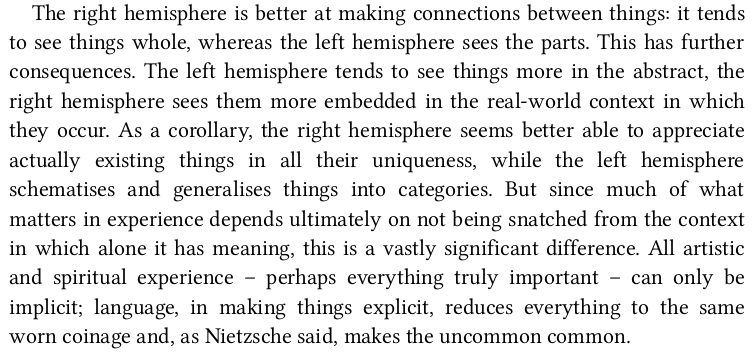
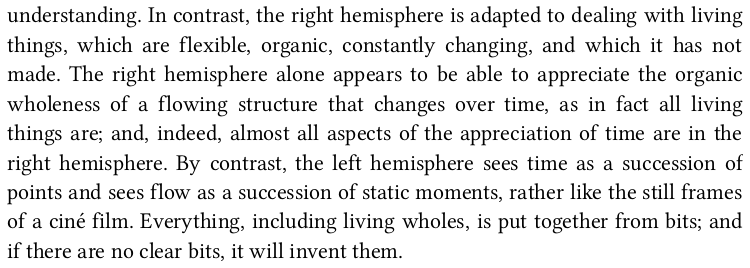
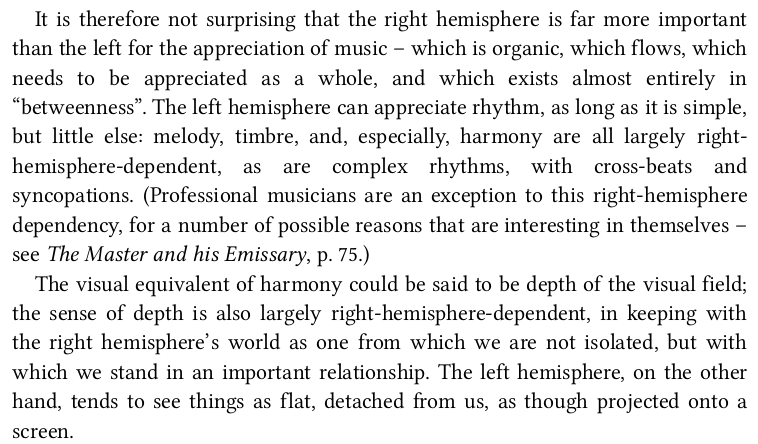
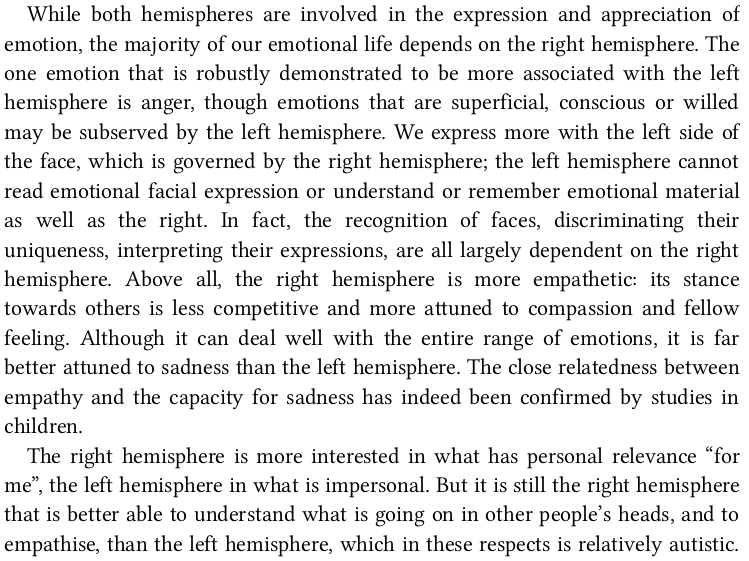



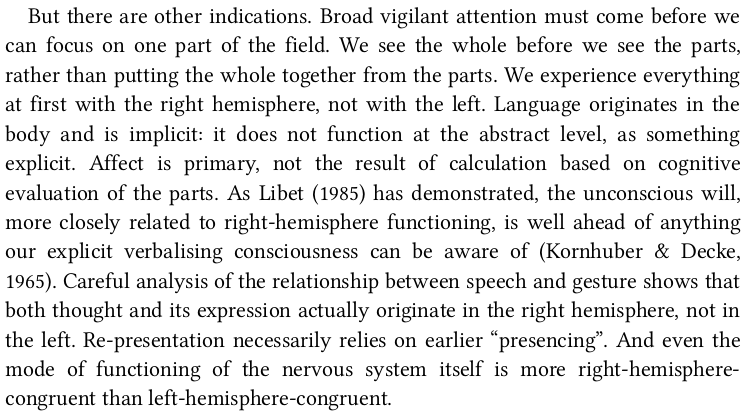
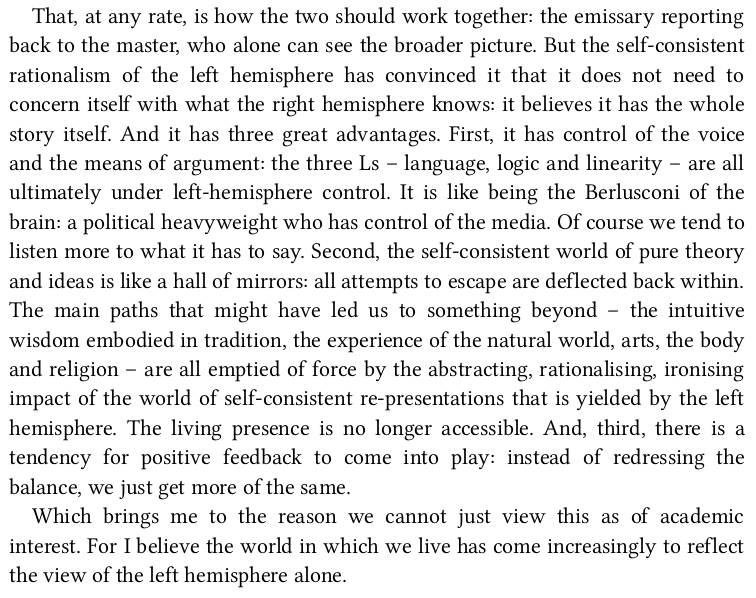
![McGilchrist makes a pretty serious case for "LH has taken over" as a diagnosis about our present situation, culturally.Reading TMahE was 1st time I distinguished the Renaissance, Reformation, Enlightenment.See also "[what scientists do] is not scientific method as conceived" McGilchrist makes a pretty serious case for "LH has taken over" as a diagnosis about our present situation, culturally.Reading TMahE was 1st time I distinguished the Renaissance, Reformation, Enlightenment.See also "[what scientists do] is not scientific method as conceived"](https://pbs.twimg.com/media/EXldprEXkAATy2g.png)
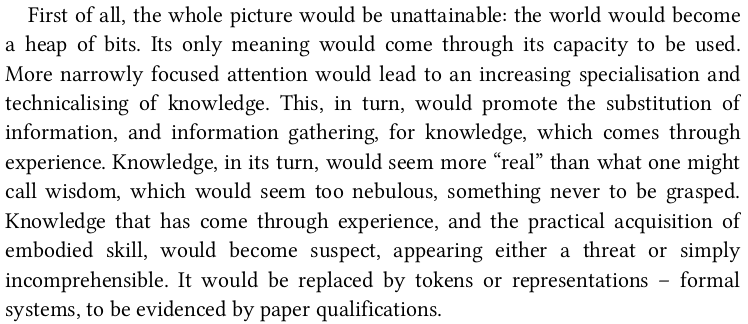 big picture reduced to meaningless bitshttps://abs.twimg.com/emoji/v2/... draggable="false" alt="🧑🏭" title="Factory worker" aria-label="Emoji: Factory worker"> increased specialization & siloinghttps://abs.twimg.com/emoji/v2/... draggable="false" alt="ℹ️" title="Informationsquelle" aria-label="Emoji: Informationsquelle"> information valued over wisdomhttps://abs.twimg.com/emoji/v2/... draggable="false" alt="🎓" title="Doktorhut" aria-label="Emoji: Doktorhut"> paper qualifications over experience" title="> Let’s do a thought experiment. What would it look like if the left hemisphere came to be the sole purveyor of our reality?https://abs.twimg.com/emoji/v2/... draggable="false" alt="🔢" title="Eingabesymbol für Ziffern" aria-label="Emoji: Eingabesymbol für Ziffern"> big picture reduced to meaningless bitshttps://abs.twimg.com/emoji/v2/... draggable="false" alt="🧑🏭" title="Factory worker" aria-label="Emoji: Factory worker"> increased specialization & siloinghttps://abs.twimg.com/emoji/v2/... draggable="false" alt="ℹ️" title="Informationsquelle" aria-label="Emoji: Informationsquelle"> information valued over wisdomhttps://abs.twimg.com/emoji/v2/... draggable="false" alt="🎓" title="Doktorhut" aria-label="Emoji: Doktorhut"> paper qualifications over experience" class="img-responsive" style="max-width:100%;"/>
big picture reduced to meaningless bitshttps://abs.twimg.com/emoji/v2/... draggable="false" alt="🧑🏭" title="Factory worker" aria-label="Emoji: Factory worker"> increased specialization & siloinghttps://abs.twimg.com/emoji/v2/... draggable="false" alt="ℹ️" title="Informationsquelle" aria-label="Emoji: Informationsquelle"> information valued over wisdomhttps://abs.twimg.com/emoji/v2/... draggable="false" alt="🎓" title="Doktorhut" aria-label="Emoji: Doktorhut"> paper qualifications over experience" title="> Let’s do a thought experiment. What would it look like if the left hemisphere came to be the sole purveyor of our reality?https://abs.twimg.com/emoji/v2/... draggable="false" alt="🔢" title="Eingabesymbol für Ziffern" aria-label="Emoji: Eingabesymbol für Ziffern"> big picture reduced to meaningless bitshttps://abs.twimg.com/emoji/v2/... draggable="false" alt="🧑🏭" title="Factory worker" aria-label="Emoji: Factory worker"> increased specialization & siloinghttps://abs.twimg.com/emoji/v2/... draggable="false" alt="ℹ️" title="Informationsquelle" aria-label="Emoji: Informationsquelle"> information valued over wisdomhttps://abs.twimg.com/emoji/v2/... draggable="false" alt="🎓" title="Doktorhut" aria-label="Emoji: Doktorhut"> paper qualifications over experience" class="img-responsive" style="max-width:100%;"/>
 abstraction & thingification of human body, world, art, etchttps://abs.twimg.com/emoji/v2/... draggable="false" alt="🧑💼" title="Office worker" aria-label="Emoji: Office worker"> fewer people doing work involving lived world, more manipulating numbers & plans & procedureshttps://abs.twimg.com/emoji/v2/... draggable="false" alt="💵" title="Banknote mit Dollar-Zeichen" aria-label="Emoji: Banknote mit Dollar-Zeichen"> fungibility - loss of sense of uniquenesshttps://abs.twimg.com/emoji/v2/... draggable="false" alt="🤖" title="Robotergesicht" aria-label="Emoji: Robotergesicht"> machine metaphorshttps://abs.twimg.com/emoji/v2/... draggable="false" alt="🔲" title="Schwarzes Quadrat" aria-label="Emoji: Schwarzes Quadrat"> either/or" title="What else if LH runs the show?https://abs.twimg.com/emoji/v2/... draggable="false" alt="👃" title="Nase" aria-label="Emoji: Nase"> abstraction & thingification of human body, world, art, etchttps://abs.twimg.com/emoji/v2/... draggable="false" alt="🧑💼" title="Office worker" aria-label="Emoji: Office worker"> fewer people doing work involving lived world, more manipulating numbers & plans & procedureshttps://abs.twimg.com/emoji/v2/... draggable="false" alt="💵" title="Banknote mit Dollar-Zeichen" aria-label="Emoji: Banknote mit Dollar-Zeichen"> fungibility - loss of sense of uniquenesshttps://abs.twimg.com/emoji/v2/... draggable="false" alt="🤖" title="Robotergesicht" aria-label="Emoji: Robotergesicht"> machine metaphorshttps://abs.twimg.com/emoji/v2/... draggable="false" alt="🔲" title="Schwarzes Quadrat" aria-label="Emoji: Schwarzes Quadrat"> either/or" class="img-responsive" style="max-width:100%;"/>
abstraction & thingification of human body, world, art, etchttps://abs.twimg.com/emoji/v2/... draggable="false" alt="🧑💼" title="Office worker" aria-label="Emoji: Office worker"> fewer people doing work involving lived world, more manipulating numbers & plans & procedureshttps://abs.twimg.com/emoji/v2/... draggable="false" alt="💵" title="Banknote mit Dollar-Zeichen" aria-label="Emoji: Banknote mit Dollar-Zeichen"> fungibility - loss of sense of uniquenesshttps://abs.twimg.com/emoji/v2/... draggable="false" alt="🤖" title="Robotergesicht" aria-label="Emoji: Robotergesicht"> machine metaphorshttps://abs.twimg.com/emoji/v2/... draggable="false" alt="🔲" title="Schwarzes Quadrat" aria-label="Emoji: Schwarzes Quadrat"> either/or" title="What else if LH runs the show?https://abs.twimg.com/emoji/v2/... draggable="false" alt="👃" title="Nase" aria-label="Emoji: Nase"> abstraction & thingification of human body, world, art, etchttps://abs.twimg.com/emoji/v2/... draggable="false" alt="🧑💼" title="Office worker" aria-label="Emoji: Office worker"> fewer people doing work involving lived world, more manipulating numbers & plans & procedureshttps://abs.twimg.com/emoji/v2/... draggable="false" alt="💵" title="Banknote mit Dollar-Zeichen" aria-label="Emoji: Banknote mit Dollar-Zeichen"> fungibility - loss of sense of uniquenesshttps://abs.twimg.com/emoji/v2/... draggable="false" alt="🤖" title="Robotergesicht" aria-label="Emoji: Robotergesicht"> machine metaphorshttps://abs.twimg.com/emoji/v2/... draggable="false" alt="🔲" title="Schwarzes Quadrat" aria-label="Emoji: Schwarzes Quadrat"> either/or" class="img-responsive" style="max-width:100%;"/>
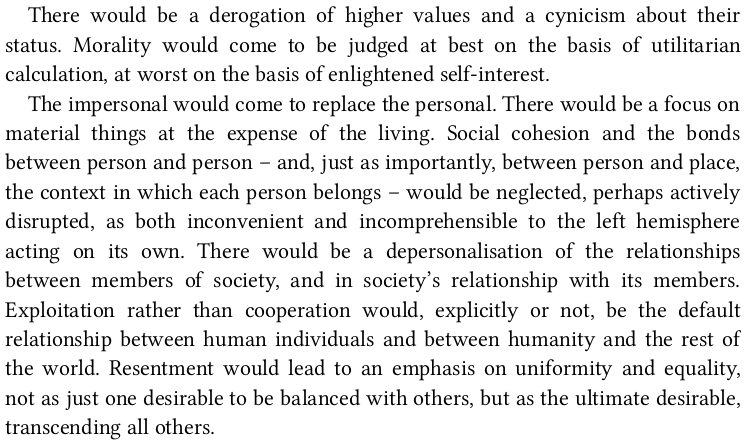 derogation of higher values, cynicismhttps://abs.twimg.com/emoji/v2/... draggable="false" alt="👤" title="Silhouette einer Büste" aria-label="Emoji: Silhouette einer Büste"> impersonal replacing personalhttps://abs.twimg.com/emoji/v2/... draggable="false" alt="💔" title="Gebrochenes Herz" aria-label="Emoji: Gebrochenes Herz"> social cohesion disruptedhttps://abs.twimg.com/emoji/v2/... draggable="false" alt="🕸️" title="Spinnennetz" aria-label="Emoji: Spinnennetz"> context devaluedhttps://abs.twimg.com/emoji/v2/... draggable="false" alt="⛏️" title="Spitzhacke" aria-label="Emoji: Spitzhacke"> exploitation, not cooperation, as default interactionhttps://abs.twimg.com/emoji/v2/... draggable="false" alt="😡" title="Schmollendes Gesicht" aria-label="Emoji: Schmollendes Gesicht"> resentment leading to overemphasis on uniformity/equality" title="Yet more, if LH in charge?https://abs.twimg.com/emoji/v2/... draggable="false" alt="🙄" title="Gesicht mit rollenden Augen" aria-label="Emoji: Gesicht mit rollenden Augen"> derogation of higher values, cynicismhttps://abs.twimg.com/emoji/v2/... draggable="false" alt="👤" title="Silhouette einer Büste" aria-label="Emoji: Silhouette einer Büste"> impersonal replacing personalhttps://abs.twimg.com/emoji/v2/... draggable="false" alt="💔" title="Gebrochenes Herz" aria-label="Emoji: Gebrochenes Herz"> social cohesion disruptedhttps://abs.twimg.com/emoji/v2/... draggable="false" alt="🕸️" title="Spinnennetz" aria-label="Emoji: Spinnennetz"> context devaluedhttps://abs.twimg.com/emoji/v2/... draggable="false" alt="⛏️" title="Spitzhacke" aria-label="Emoji: Spitzhacke"> exploitation, not cooperation, as default interactionhttps://abs.twimg.com/emoji/v2/... draggable="false" alt="😡" title="Schmollendes Gesicht" aria-label="Emoji: Schmollendes Gesicht"> resentment leading to overemphasis on uniformity/equality" class="img-responsive" style="max-width:100%;"/>
derogation of higher values, cynicismhttps://abs.twimg.com/emoji/v2/... draggable="false" alt="👤" title="Silhouette einer Büste" aria-label="Emoji: Silhouette einer Büste"> impersonal replacing personalhttps://abs.twimg.com/emoji/v2/... draggable="false" alt="💔" title="Gebrochenes Herz" aria-label="Emoji: Gebrochenes Herz"> social cohesion disruptedhttps://abs.twimg.com/emoji/v2/... draggable="false" alt="🕸️" title="Spinnennetz" aria-label="Emoji: Spinnennetz"> context devaluedhttps://abs.twimg.com/emoji/v2/... draggable="false" alt="⛏️" title="Spitzhacke" aria-label="Emoji: Spitzhacke"> exploitation, not cooperation, as default interactionhttps://abs.twimg.com/emoji/v2/... draggable="false" alt="😡" title="Schmollendes Gesicht" aria-label="Emoji: Schmollendes Gesicht"> resentment leading to overemphasis on uniformity/equality" title="Yet more, if LH in charge?https://abs.twimg.com/emoji/v2/... draggable="false" alt="🙄" title="Gesicht mit rollenden Augen" aria-label="Emoji: Gesicht mit rollenden Augen"> derogation of higher values, cynicismhttps://abs.twimg.com/emoji/v2/... draggable="false" alt="👤" title="Silhouette einer Büste" aria-label="Emoji: Silhouette einer Büste"> impersonal replacing personalhttps://abs.twimg.com/emoji/v2/... draggable="false" alt="💔" title="Gebrochenes Herz" aria-label="Emoji: Gebrochenes Herz"> social cohesion disruptedhttps://abs.twimg.com/emoji/v2/... draggable="false" alt="🕸️" title="Spinnennetz" aria-label="Emoji: Spinnennetz"> context devaluedhttps://abs.twimg.com/emoji/v2/... draggable="false" alt="⛏️" title="Spitzhacke" aria-label="Emoji: Spitzhacke"> exploitation, not cooperation, as default interactionhttps://abs.twimg.com/emoji/v2/... draggable="false" alt="😡" title="Schmollendes Gesicht" aria-label="Emoji: Schmollendes Gesicht"> resentment leading to overemphasis on uniformity/equality" class="img-responsive" style="max-width:100%;"/>
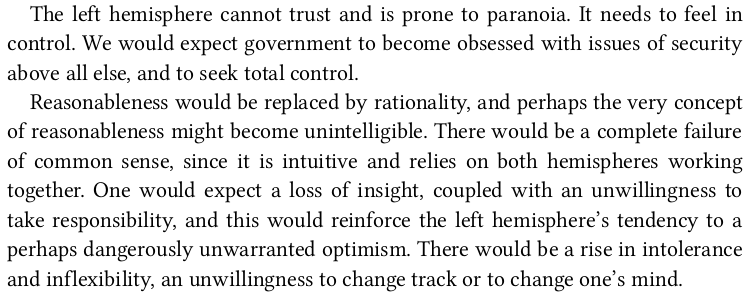 govt paranoia & obsession w controlhttps://abs.twimg.com/emoji/v2/... draggable="false" alt="🤔" title="Denkendes Gesicht" aria-label="Emoji: Denkendes Gesicht"> reasonableness replaced by rationalityhttps://abs.twimg.com/emoji/v2/... draggable="false" alt="🤦♀️" title="Frau schlägt sich die Hand vors Gesicht" aria-label="Emoji: Frau schlägt sich die Hand vors Gesicht"> failure of common sense (relies on hemisphere cooperation)https://abs.twimg.com/emoji/v2/... draggable="false" alt="❓" title="Rotes Fragezeichen-Symbol" aria-label="Emoji: Rotes Fragezeichen-Symbol">loss of insighthttps://abs.twimg.com/emoji/v2/... draggable="false" alt="🤷♂️" title="Achselzuckender Mann" aria-label="Emoji: Achselzuckender Mann">unwillingness to take responsibilityhttps://abs.twimg.com/emoji/v2/... draggable="false" alt="🤨" title="Gesicht mit hochgezogener Augenbraue" aria-label="Emoji: Gesicht mit hochgezogener Augenbraue"> intolerance & inflexibilityhttps://abs.twimg.com/emoji/v2/... draggable="false" alt="🙉" title="Nichts hören-Affe" aria-label="Emoji: Nichts hören-Affe"> unwillingness to change one& #39;s mind" title="What else?https://abs.twimg.com/emoji/v2/... draggable="false" alt="👀" title="Augen" aria-label="Emoji: Augen"> govt paranoia & obsession w controlhttps://abs.twimg.com/emoji/v2/... draggable="false" alt="🤔" title="Denkendes Gesicht" aria-label="Emoji: Denkendes Gesicht"> reasonableness replaced by rationalityhttps://abs.twimg.com/emoji/v2/... draggable="false" alt="🤦♀️" title="Frau schlägt sich die Hand vors Gesicht" aria-label="Emoji: Frau schlägt sich die Hand vors Gesicht"> failure of common sense (relies on hemisphere cooperation)https://abs.twimg.com/emoji/v2/... draggable="false" alt="❓" title="Rotes Fragezeichen-Symbol" aria-label="Emoji: Rotes Fragezeichen-Symbol">loss of insighthttps://abs.twimg.com/emoji/v2/... draggable="false" alt="🤷♂️" title="Achselzuckender Mann" aria-label="Emoji: Achselzuckender Mann">unwillingness to take responsibilityhttps://abs.twimg.com/emoji/v2/... draggable="false" alt="🤨" title="Gesicht mit hochgezogener Augenbraue" aria-label="Emoji: Gesicht mit hochgezogener Augenbraue"> intolerance & inflexibilityhttps://abs.twimg.com/emoji/v2/... draggable="false" alt="🙉" title="Nichts hören-Affe" aria-label="Emoji: Nichts hören-Affe"> unwillingness to change one& #39;s mind" class="img-responsive" style="max-width:100%;"/>
govt paranoia & obsession w controlhttps://abs.twimg.com/emoji/v2/... draggable="false" alt="🤔" title="Denkendes Gesicht" aria-label="Emoji: Denkendes Gesicht"> reasonableness replaced by rationalityhttps://abs.twimg.com/emoji/v2/... draggable="false" alt="🤦♀️" title="Frau schlägt sich die Hand vors Gesicht" aria-label="Emoji: Frau schlägt sich die Hand vors Gesicht"> failure of common sense (relies on hemisphere cooperation)https://abs.twimg.com/emoji/v2/... draggable="false" alt="❓" title="Rotes Fragezeichen-Symbol" aria-label="Emoji: Rotes Fragezeichen-Symbol">loss of insighthttps://abs.twimg.com/emoji/v2/... draggable="false" alt="🤷♂️" title="Achselzuckender Mann" aria-label="Emoji: Achselzuckender Mann">unwillingness to take responsibilityhttps://abs.twimg.com/emoji/v2/... draggable="false" alt="🤨" title="Gesicht mit hochgezogener Augenbraue" aria-label="Emoji: Gesicht mit hochgezogener Augenbraue"> intolerance & inflexibilityhttps://abs.twimg.com/emoji/v2/... draggable="false" alt="🙉" title="Nichts hören-Affe" aria-label="Emoji: Nichts hören-Affe"> unwillingness to change one& #39;s mind" title="What else?https://abs.twimg.com/emoji/v2/... draggable="false" alt="👀" title="Augen" aria-label="Emoji: Augen"> govt paranoia & obsession w controlhttps://abs.twimg.com/emoji/v2/... draggable="false" alt="🤔" title="Denkendes Gesicht" aria-label="Emoji: Denkendes Gesicht"> reasonableness replaced by rationalityhttps://abs.twimg.com/emoji/v2/... draggable="false" alt="🤦♀️" title="Frau schlägt sich die Hand vors Gesicht" aria-label="Emoji: Frau schlägt sich die Hand vors Gesicht"> failure of common sense (relies on hemisphere cooperation)https://abs.twimg.com/emoji/v2/... draggable="false" alt="❓" title="Rotes Fragezeichen-Symbol" aria-label="Emoji: Rotes Fragezeichen-Symbol">loss of insighthttps://abs.twimg.com/emoji/v2/... draggable="false" alt="🤷♂️" title="Achselzuckender Mann" aria-label="Emoji: Achselzuckender Mann">unwillingness to take responsibilityhttps://abs.twimg.com/emoji/v2/... draggable="false" alt="🤨" title="Gesicht mit hochgezogener Augenbraue" aria-label="Emoji: Gesicht mit hochgezogener Augenbraue"> intolerance & inflexibilityhttps://abs.twimg.com/emoji/v2/... draggable="false" alt="🙉" title="Nichts hören-Affe" aria-label="Emoji: Nichts hören-Affe"> unwillingness to change one& #39;s mind" class="img-responsive" style="max-width:100%;"/>
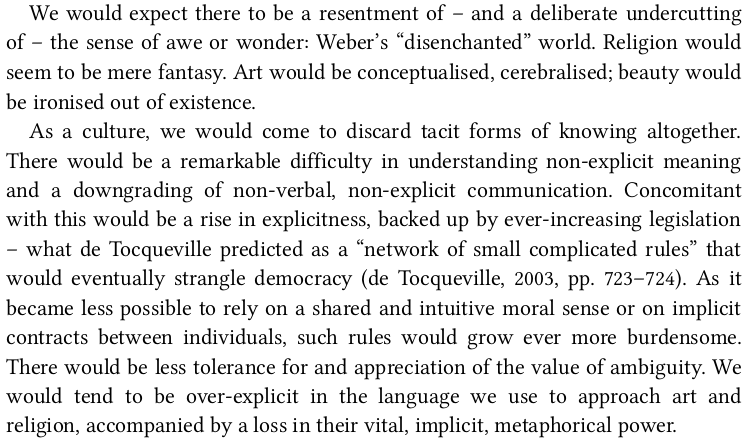 resentment & undercutting of awe/wonderhttps://abs.twimg.com/emoji/v2/... draggable="false" alt="👻" title="Geist" aria-label="Emoji: Geist"> religion seen as mere fantasyhttps://abs.twimg.com/emoji/v2/... draggable="false" alt="🤝" title="Handschlag" aria-label="Emoji: Handschlag"> tacit knowing, non-verbal communication, & implicit contracts downgradedhttps://abs.twimg.com/emoji/v2/... draggable="false" alt="🗳️" title="Wahlurne mit Stimmzettel" aria-label="Emoji: Wahlurne mit Stimmzettel"> democracy strangled by ever-complicating ruleshttps://abs.twimg.com/emoji/v2/... draggable="false" alt="🐾" title="Pfotenabdrücke" aria-label="Emoji: Pfotenabdrücke"> intolerance for ambiguity, rather than appreciation" title="But wait—there& #39;s more!https://abs.twimg.com/emoji/v2/... draggable="false" alt="🤩" title="Vom Star geblendet" aria-label="Emoji: Vom Star geblendet"> resentment & undercutting of awe/wonderhttps://abs.twimg.com/emoji/v2/... draggable="false" alt="👻" title="Geist" aria-label="Emoji: Geist"> religion seen as mere fantasyhttps://abs.twimg.com/emoji/v2/... draggable="false" alt="🤝" title="Handschlag" aria-label="Emoji: Handschlag"> tacit knowing, non-verbal communication, & implicit contracts downgradedhttps://abs.twimg.com/emoji/v2/... draggable="false" alt="🗳️" title="Wahlurne mit Stimmzettel" aria-label="Emoji: Wahlurne mit Stimmzettel"> democracy strangled by ever-complicating ruleshttps://abs.twimg.com/emoji/v2/... draggable="false" alt="🐾" title="Pfotenabdrücke" aria-label="Emoji: Pfotenabdrücke"> intolerance for ambiguity, rather than appreciation" class="img-responsive" style="max-width:100%;"/>
resentment & undercutting of awe/wonderhttps://abs.twimg.com/emoji/v2/... draggable="false" alt="👻" title="Geist" aria-label="Emoji: Geist"> religion seen as mere fantasyhttps://abs.twimg.com/emoji/v2/... draggable="false" alt="🤝" title="Handschlag" aria-label="Emoji: Handschlag"> tacit knowing, non-verbal communication, & implicit contracts downgradedhttps://abs.twimg.com/emoji/v2/... draggable="false" alt="🗳️" title="Wahlurne mit Stimmzettel" aria-label="Emoji: Wahlurne mit Stimmzettel"> democracy strangled by ever-complicating ruleshttps://abs.twimg.com/emoji/v2/... draggable="false" alt="🐾" title="Pfotenabdrücke" aria-label="Emoji: Pfotenabdrücke"> intolerance for ambiguity, rather than appreciation" title="But wait—there& #39;s more!https://abs.twimg.com/emoji/v2/... draggable="false" alt="🤩" title="Vom Star geblendet" aria-label="Emoji: Vom Star geblendet"> resentment & undercutting of awe/wonderhttps://abs.twimg.com/emoji/v2/... draggable="false" alt="👻" title="Geist" aria-label="Emoji: Geist"> religion seen as mere fantasyhttps://abs.twimg.com/emoji/v2/... draggable="false" alt="🤝" title="Handschlag" aria-label="Emoji: Handschlag"> tacit knowing, non-verbal communication, & implicit contracts downgradedhttps://abs.twimg.com/emoji/v2/... draggable="false" alt="🗳️" title="Wahlurne mit Stimmzettel" aria-label="Emoji: Wahlurne mit Stimmzettel"> democracy strangled by ever-complicating ruleshttps://abs.twimg.com/emoji/v2/... draggable="false" alt="🐾" title="Pfotenabdrücke" aria-label="Emoji: Pfotenabdrücke"> intolerance for ambiguity, rather than appreciation" class="img-responsive" style="max-width:100%;"/>


